Reinterpreting Muhammadiyah’s Purification and Its Implications for the Educational Philosophy
DOI:
https://doi.org/10.22219/progresiva.v12i02.29596Keywords:
Muhammadiyah, Islamic education, Ideologi, Islamic ToughtAbstract
This article mainly explores the changing and development of thought that occurred in one of the largest modernist Islamic organizations in Indonesia, Muhammadiyah, regarding Islamic purification. Using intellectual history as an approach, this research concluded that even though Muhammadiyah had purification as its main characteristic, in fact it had its own reinterpretation being extended and expanded. By implementing Abdolkarim Soroush’s theory of contraction and expansion of religious knowledge, this research found that in the very early days of its inception, Muhammadiyah constructed its concept of purification from the spiritualization, rationalization, and functionalization of Islamic teachings. But after the inception of Tarjih division in 1927, the purification in Muhammadiyah had a narrower orientation from worships and creeds (puritanism) to the muamalah of world affairs (ultra-puritanism). Beginning in 1995, there was a wider scope in which the Tarjih division in Muhammadiyah expanded its issues of worship to include public and humanitarian issues; that era was called post-puritanism. Based on the core hypothesis that any changes in religious thought have implications for educational orientation, from George R. Knight’s perspective, several educational implications are obtained: (1) In the early days of its inception, Muhammadiyah’s education implemented a progressivism philosophy that’s inspired by religion, rationality, and life; (2) when it comes to the narrower aspect of purification only for faith, worship, and muamalah, Muhammadiyah shifted its educational philosophy to perennialism-essentialism; (3) when the purification's meaning and interpretation expanded, Muhammadiyah tended its education toward the philosophy of reconstructionism.
Downloads
References
Abdul Munir Mulkhan. (2015). Boeah Fikiran Kijahi H.A. Dachlan . Global Base Review & STIEAD Press.
Achmadi. (2002). Muhammadiyah Pascakemerdekaan: Pemikiran Keagamaan dan Implikasinya dalam Pendidikan. UIN Sunan Kalijaga.
Ahmad Najib Burhani. (2014). Islam Murni VS Islam Progresif di Muhammadiyah: Melihat Wajah Islam Reformis Indonesia. In Martin van Bruinessen (Ed.), Conservative Turn: Islam Indonesia dalam Ancaman Fundamentalisme. Mizan.
Ahmad Nur Fuad. (2010). Kontinuitas dan Diskontinuitas Pemikiran Keagamaan dalam Muhammadiyah 1923-2008: Tinjauan Sejarah Intelektual. UIN Sunan Ampel.
Akbar, A. (2022). Abdolkarim Soroush’s Theory of Revelation: From Expansion and Contraction of Religious Knowledge to Prophetic Dreams. Islam and Christian-Muslim Relations, 33(1). https://doi.org/10.1080/09596410.2021.1981632
Badarussyamsi, B. (2016). Pemikiran Abdulkarim Soroush tentang Persoalan Otoritas Kebenaran Agama. ISLAMICA: Jurnal Studi Keislaman, 10(1). https://doi.org/10.15642/islamica.2015.10.1.56-81
Baidhawy, Z. (2015). Lazismu and remaking the Muhammadiyah’s new way of philanthropy. Al-Jami’ah, 53(2). https://doi.org/10.14421/ajis.2015.532.387-412
Baidhawy, Z., & Khoirudin, A. (2018). The Core Ethos and the Progressive Spirit of Muhammadiyah Socio-Religious Movement. Journal of Al-Tamaddun, 13(2). https://doi.org/10.22452/jat.vol13no2.3
Beck, H. L. (2014). The contested state of Sufism in Islamic Modernism: The case of the Muhammadiyah movement in twentieth-century Indonesia. In Journal of Sufi Studies (Vol. 3, Issue 2). https://doi.org/10.1163/22105956-12341269
Birchok, D. A. (2016). The Crescent Arises over the Banyan Tree: A Study of the Muhammadiyah Movement in a Central Javanese Town, c. 1910s–2010 by Mitsuo Nakamura. Indonesia, 101(1). https://doi.org/10.1353/ind.2016.0005
Burhani, A. N. (2018). Pluralism, liberalism and islamism: Religious outlook of Muhammadiyah. Studia Islamika, 25(3). https://doi.org/10.15408/sdi.v25i3.7765
Dawam Rahardjo. (1993). Intelektual Intelegensia dan Prilaku Politik Bangsa: Risalah Cendekiawan Muslim. Mizan.
Fatchurrahman Djamil. (2005). Tajdid Muhammadiyah Pada 100 Tahun Pertama. In Mifedwil Jandra and M. Safar Nasir (Ed.), Tajdid Muhammadiyah Untuk Pencerahan Peradaban. Majelis Tarjih dan Pengembangan Pemikiran Islam PP Muhammadiyah dan Universitas Ahmad Dahlan Press.
George R. Knight. (2006). Philosophy and Education: An Introduction in Christian Perspective (4th ed.). Andrews University Press.
George R. Knight. (2007). Filsafat Pendidikan. CDIE & Gama Media.
Haedar Nashir. (2013). Islam Syariat: Reproduksi Salafiyah Ideologis di Indonesia. Mizan.
Haedar Nashir. (2015). Understanding the Ideology of Muhammadiyah. Muhammadiyah University Press.
Hamzah F. (2016). Dasar Pemikiran Islam Berkemajuan Muhammadiyah 1912-1923. UIN Alauddin .
Herman L. Beck. (2019). Fenomenologi Islam Modernis: Kisah Perjumpaan Muhammadiyah dengan Kebhinnekaan Perilaku Beragama. Suara Muhammadiyah.
Hilman Latief. (2017). Post-Puritanisme: Pemikiran Gerakan Islam Modernis 1995-2015 . LP3M Universitas Muhammadiyah Yogyakarta.
Johns, A. H., & Peacock, J. L. (1981). Purifying the Faith. The Muhammadijah Movement in Indonesian Islam. Pacific Affairs, 54(3). https://doi.org/10.2307/2756824
Jurdi, S. (2011). Muhammadiyah dalam Dinamika Politik Indonesia 1966-2006. Tajdida, 9(1).
Kim, H.-J. (2010). Praxis and Religious Authority in Islam: The Case of Ahmad Dahlan, Founder of Muhammadiyah. Studia Islamika, 17(1). https://doi.org/10.15408/sdi.v17i1.468
KRH Hadjid. (2013). Pelajaran KHA Dahlan: 7 Falsafah dan 17 Kelompok Ayat Al-Qur’an . MPI PPM.
Kuntowijoyo. (1985). Muhammadiyah dalam Perspektif Sejarah. In Amien Rais dkk (Ed.), Pendidikan Muhammadiyah dan Perubahan Sosial . PLP2M.
M. Amin Abdullah. (2019). Fresh Ijtihad: Manhaj Pemikiran Muhammadiyah Di Era Disrupsi. Suara Muhammadiyah.
M. Amin Abdullah. (2020). Dinamika Islam Kultural: Pemetaan Atas Wacana Keislaman Kontemporer. IRCiSoD.
Mulkhan, A. M. (2000). “Teologi” Petani: Respon Masyarakat Petani terhadap Islam Murni. Unisia, 22(41). https://doi.org/10.20885/unisia.vol22.iss41.art2
Mulkhan, A. M. (2008). Islamic Education and Da’wah Liberalization: Investigating Kiai Achmad Dachlan’s Ideas. Al-Jami’ah: Journal of Islamic Studies, 46(2). https://doi.org/10.14421/ajis.2008.462.401-430
Mulyadi, S. (2006). Max Weber’s remarks on Islam: The Protestant ethic among Muslim puritans. Islam and Christian-Muslim Relations, 17(2). https://doi.org/10.1080/09596410600604484
Mu’ti, A. (2016). Akar Pluralisme dalam pendidikan Muhammadiyah. Afkaruna, 12(1). https://doi.org/10.18196/aiijis.2016.0053.1-42
Nashir, H., Kartono, D. T., Susilo, R. K. D., & Setiaji, B. (2019). Islam in Indonesia: From puritanism to enlightening religion in the case of muhammadiyah. Asia Life Sciences, 28(1).
Saleh, F. (2021). Modern Trends in Islamic Theological Discourse in 20th Century Indonesia. In Modern Trends in Islamic Theological Discourse in 20th Century Indonesia. https://doi.org/10.1163/9789047401131
Syamsuddin, M. D. (1995). The muhammadiyah da’wah and allocative politics in the new order Indonesia. Studia Islamika, 2(2). https://doi.org/10.15408/sdi.v2i2.834
Zakiyuddin Baidhawy, & Azaki Khoirudin. (2017). Etika Muhammadiyah dan Spirit Peradaban. Suara Muhammadiyah.
Downloads
Published
How to Cite
Issue
Section
License
Copyright (c) 2023 Azaki Khoirudin, Qaem Aulassyahied

This work is licensed under a Creative Commons Attribution-ShareAlike 4.0 International License.


















